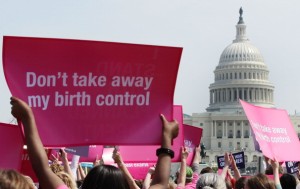
Because of discrimination, violence against women, less access to education, and an intersection of additional human right abuses, women and girls are disproportionately affected when sexual and reproductive rights are denied (Photo credit: Mark Wilson/Getty Images).
By Tarah Demant, Women’s Human Rights Coordination Group
Today, nearly 3,000 people will be infected with HIV. Yet, only 34% of young people in developing countries can answer five basic questions about HIV and how to prevent it.
Around the world, one woman dies every 90 seconds from complications of pregnancy or childbirth—more than 350,000 women every year. The vast majority of these deaths are preventable—child marriage, unsafe and unprotected sex, and inadequate care during pregnancy all contribute to this alarming number.
Complications during pregnancy and childbirth, gender-based violence and AIDS are among the leading causes of mortality for young people. Complications from pregnancy are the leading cause of death among adolescent girls aged 15 to 19 in developing countries.

 Yesterday on
Yesterday on